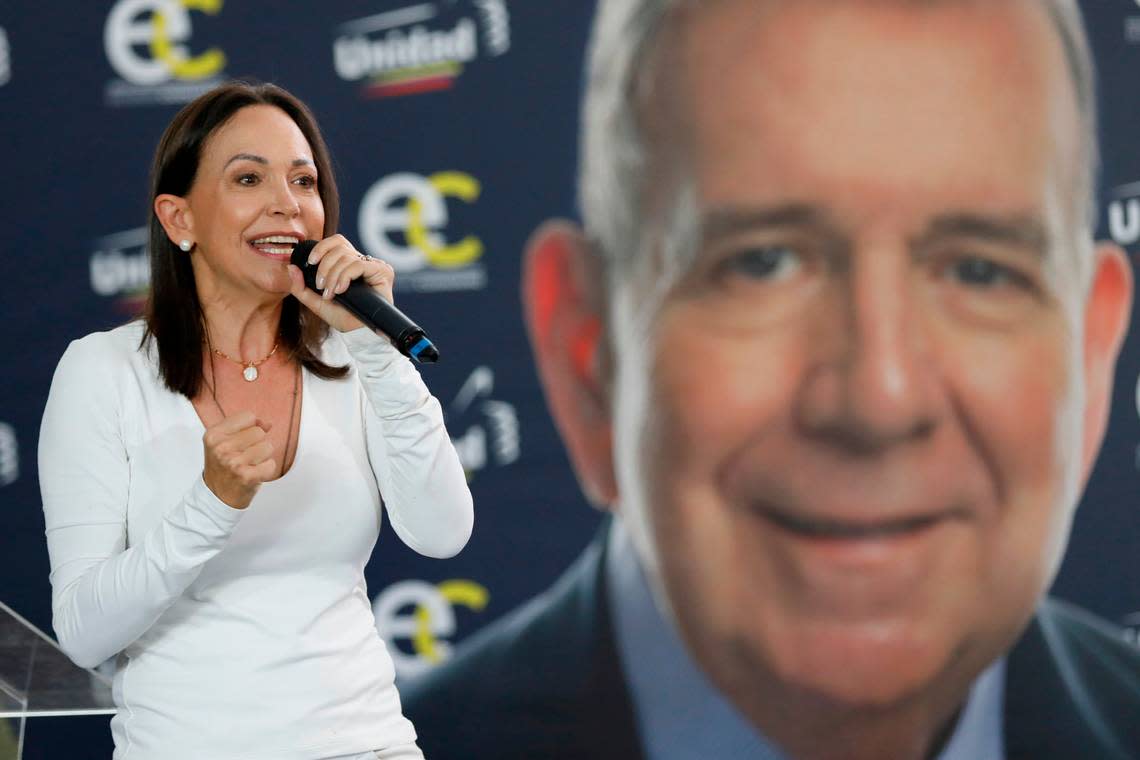Venezuelans have their best chance yet to end a dictatorship, and the U.S. is watching | Opinion

- Oops!Something went wrong.Please try again later.
- Oops!Something went wrong.Please try again later.
Venezuelans have their last, best chance to end Venezuela’s lost decade on Sunday.
For the first time since 2013, Venezuelans will cast votes for a genuine alternative to Nicolás Maduro’s dictatorial regime. Make no mistake, this will not be a free and fair election. It is already clear that the contest will not remotely resemble international standards.
María Corina Machado, the opposition leader who has brought thousands of enthusiastic supporters to the streets and won over 90% of her primary vote, was barred from running for president. In addition, international observers and independent media have been stifled or turned away from reporting the truth.
Opposition organizers and human rights activists have been harassed, surveilled, and arbitrarily imprisoned. In a disturbing echo of right-wing American politicians, Maduro himself has made clear that he has no plans to accept defeat and promised a “blood bath” and “fratricidal civil war” will ensue if he loses.
It may seem hopeless, particularly for those who share my dedication to promoting Latin American democracy and rule of law. But my Venezuelan constituents have faced much tougher challenges.
Machado has galvanized Venezuelans to support the one opposition candidate who remains on the ballot. She sees a narrow, indirect path to victory.
Millions of Venezuelans will turn out to vote for substitute candidate Edmundo González Urritia. The unassuming and, until recently, unknown diplomat leads Maduro in most polls.
The opposition’s strategy is deceptively simple: win a decisive majority of votes — by margins too big to rig — and force Maduro to negotiate a transition of power or risk losing control of the country. The opposition is mobilizing against voter suppression, disinformation, and ballot tampering by organizing and educating voters to observe and report irregularities.
Of course, Maduro may well reject the results. His Russian, Iranian and Cuban patrons will bet the U.S. has lost its appetite for sanctions and will prioritize gas prices over democracy. But the impacts will ripple far beyond prices at the pump. A Maduro win will undoubtedly mean a new surge of migrants, further destabilizing the region.
But Venezuela’s opposition cannot bring Maduro to the table unless the U.S. and its democratic partners continue to bring pressure to bear.
The Biden-Harris Administration has successfully employed strict sanctions and leveraged relief to induce concessions from Maduro. If they hadn’t negotiated the Barbados Agreement last year, which freed all wrongfully detained Americans in Venezuela, there may be no election to speak of today.
Since then, the Administration has not hesitated to restore punitive measures against the regime. When Maduro broke his word by banning Machado’s candidacy, Biden snapped oil and gas sanctions back into place.
Now, the U.S. must make the stakes painstakingly clear.
We must send the message that any attempt to threaten the lives of Machado or Gonzalez, suppress the vote with violence or disinformation or undermine the election outright will be met with harsh consequences. We must be willing to employ all tools at our disposal to defend democracy, and demonstrate the credibility of our threats by following through.
We must also make equally clear that if Maduro recognizes the election results and allows a peaceful transition, the U.S. will end Venezuela’s pariah status, support reconstruction of its institutions and end this political crisis, once and for all.
I’m disappointed the GOP-controlled House adjourned without reauthorizing the “VERDAD Act” or enacting new legislation to underscore this message, but my bipartisan colleagues and I will closely monitor the election results, and prepare to do our part.
The opposition has stepped up to compete in an unfree, unfair election. Now it’s up to us to have their back.
Democratic U.S. Rep. Debbie Wasserman Schultz represents Florida’s District 25 covering Broward County.

